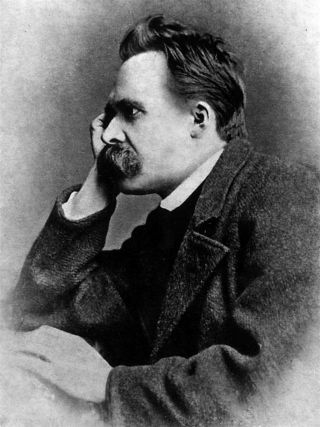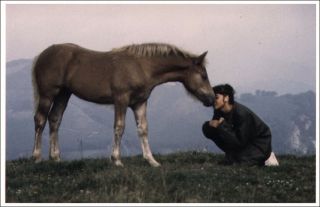In January 1889, Friedrich Nietzsche went insane.
Armed with metaphor, irony and aphorism, the German philosopher carved his influence deep into 20th century culture, criticism, literature and psychology. Freud, Mann, Yeats, Richard Strauss and countless other artists and thinkers were shaped by the “first Immoralist”. In popular culture, Nietzsche was idolized and vilified for his Zarathustra coming down out of his cave in the mountains with an eagle and a staff and declaring that god was dead.

But despite the death of god, despite the nihilism and the altered manuscripts, Nietzsche’s writing affirmed life. It was filled with courage. Nietzsche embraced the hardships, boundaries and sickness of the world and called upon each of us to stretch beyond the social constructs of culture and the moral legacy that is our inheritance.
But then on January 3, 1889, everything unraveled. While in an open air market in Turin, Nietzsche witnessed a merchant flogging a horse. He ran to the animal and yelled for the beating to stop. He threw himself between beast and whip, and hugged the equine’s thick neck. This frail and sickly philosopher who gave us the Übermensch and slave morality, then collapsed, weeping.
I understand why Nietzsche hugged the horse’s head. Life is hard. It is not fair. It is filled with rapturous beautiful moments and it all ends much, much too quickly. When we look around and see so many people who are unnecessarily cruel, or mindless, or oblivious to inequities; when see our brothers and neighbors exhaling their numbered breaths in ways that add to the pain or take from the sympathy, we see a world that is, in fact, more absurd and nihilistic than anything the philosopher wrote or said or thought. To see these mindless cruelties played out before him was simply too much for the philosopher to bear; especially when the remedy, the antidote – even our purpose for being here – is so very clear.
Nietzsche was a pastor’s son. Raised on nagging hypocrisies and half-truths of a faith half-applied, Nietzsche rejected everything. The prophets did too: Jeremiah and Isaiah, Mohammad and Siddhartha. Even Christ. But whether obvious or ironic, the remedy was there, at the center, all along. It is that certain truth, absolute but malleable, at the center of every faith tradition. We look up from our desks or push ourselves away from the table and see people treated unfairly at work or on the playground or at the church fish fry. It happens in our very own homes. Yet all any of us need, all every one of us need, is understanding, patience, kindness, and simple human respect. Every one of us is just bumping around trying the best we can. Everyone one of us is dealing with the same raw adaptive imperatives: births, deaths and the sufferings and sicknesses of loved ones. We wake in the morning with a new tumor or must move our bowels in a bag hung under our shirts or we struggle to find answers or reasons for so many human dilemmas that are simply a part of living. No wonder sometimes we ourselves can be unknowingly cruel or thoughtless or rudely blunt. Yet we are all just doing our best. In a world where we all make mistakes, where our motives are misunderstood, the only answer that makes sense is to give ourselves over to kindness, forgiveness, patience and understanding.

Go down to the marketplace. Empty your pockets of fear and self-consciousness. Lay everything you are out bare on a blanket. Exchange what you thought was in your “best interest” for a more humane humility. For one day, the horse’s head we will be hugging, will be pointing toward eternity.
***** Photo Credits:
Thank you to Ferran Jordà/Flickr for making “l’amor és finit i…et l’amour fini” available pursuant to a creative commons licence via Flickr. “Nietzsche1882” by Gustav-Adolf Schultze (d. 1897) – Nietzsche by Walter Kaufmann, Princeton Paperbacks, Fourth Edition. ISBN 0-691-01983-5. Licensed under Public Domain via Wikimedia Commons





The human race has had at the fore of every generation those who would carry the “race thought” into the future. Nietzsche would prove one of many of these such people who at the time are usually ignored, even villified. If a majority of people in any given generation are able to apprehend the main thrust or concept of their time and run with it, humanity goes much farther into the future than otherwise, making the task of evolution that much easier for their offspring. Unfortunately, the barriers of ego and individualism prove to be too great for these lead ideas to bear fruit in lives. It is believed that this generation will prove to be the one where a “critical mass” will rise, determined to resist the status quo of staid determinism and nihillation to achieve mankind’s destiny among the stars.
Thank you for your thoughtful comment David. It can be hard to keep pushing for what is right and good when the dominant theme often seems to be self-interest, shortsightedness and mindlessness. I am encouraged though by people I meet everyday who try the best to err on the side of kindness. They are out there. We need to support one another.